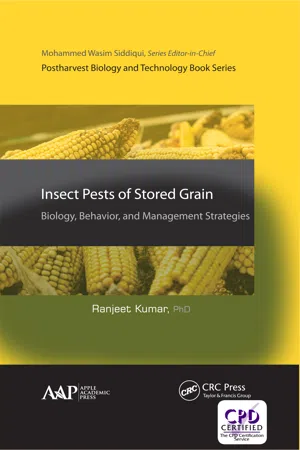
Insect Pests of Stored Grain
Biology, Behavior, and Management Strategies
Ranjeet Kumar
- 394 páginas
- English
- ePUB (apto para móviles)
- Disponible en iOS y Android
Insect Pests of Stored Grain
Biology, Behavior, and Management Strategies
Ranjeet Kumar
Información del libro
Stored products of agriculture and animal origin are attacked by more than 600 species of beetles, 70 species of moths, and about 355 species of mites, causing huge quantitative and qualitative losses and insect contamination in food commodities. This is an important quality control problem. This book, Insect Pests of Stored Grain: Biology, Behavior, and Management Strategies, provides comprehensive coverage of stored product entomology for the sustainable management of insects and other noninsect pests, such as mites, birds, rodents, and fungi, with the aim to mitigate and eliminate these losses of food from grains.
The author, who has studied sustainable and herbal management of stored grain and seed insect pests in his research, considers sustainable management of stored grain insect pests and eco-friendly approaches along with the utilization of waste materials. Starting with a history of stored product entomology from the beginning to the modern era in detail along with an introduction of storage entomology, the book then goes on to cover a range of important issues, including
- Significant developments in the field of storage entomology
- Classification and identification of important stored grain insects
- Major stored product coleopteran and lepidopteran insects that infest stored commodities
- Estimation of losses caused by stored grain insect pests
- Factors responsible for infestation of stored grain insects
- Different storage structures
- Alternative methods for the management of stored grain insects by utilization of behavior modification techniques or utilization of secondary metabolites of plants
- Fumigation of stored grains for the protection of infestation
-
Insect Pests of Stored Grain: Biology, Behavior, and Management Strategies covers a vast amount of valuable information on stored product entomology for the sustainable management of insects and other noninsect pests.
Preguntas frecuentes
Información
CONTENTS
ABOUT THE AUTHOR

ABOUT THE BOOK SERIES: POSTHARVEST BIOLOGY AND TECHNOLOGY
- Nutritional composition and antioxidant properties of fresh produce
- Postharvest physiology and biochemistry
- Biotic and abiotic factors affecting maturity and quality
- Preharvest treatments affecting postharvest quality
- Maturity and harvesting issues
- Nondestructive quality assessment
- Physiological and biochemical changes during ripening
- Postharvest treatments and their effects on shelf life and quality
- Postharvest operations such as sorting, grading, ripening, de-greening, curing etc
- Storage and shelf-life studies
- Packaging, transportation, and marketing
- Vase life improvement of flowers and foliage
- Postharvest management of spice, medicinal, and plantation crops
- Fruit and vegetable processing waste/byproducts: management and utilization
- Postharvest diseases and physiological disorders
- Minimal processing of fruits and vegetables
- Quarantine and phytosanitory treatments for fresh produce
- Conventional and modern breeding approaches to improve the postharvest quality
- Biotechnological approaches to improve postharvest quality of horticultural crops
LIST OF ABBREVIATIONS
| ACS | American Chemical Society |
| ADI | Acceptable daily intake |
| APC | Agricultural Price Commission |
| APEDA | Agricultural and Processed Food Products Export Development Authority |
| CA | controlled atmosphere |
| CACP | Commission on Agricultural Costs and Prices |
| CNS | central nervous system |
| CT | carbon tetrachloride |
| CWC | Central Warehousing Corporation |
| DIPA | destructive insect pest act |
| DPPQS | Directorate of Plant Protection and Storage |
| EC | economic community |
| EDB | ethylene dibromide |
| EPA | Environmental Protection Agency |
| FAO | Food and Agriculture Organization |
| FCI | Food Corporation of India |
| GC | gas chromatography |
| GCMS | gas chromatography and mass spectra |
| GIT | gastrointestinal tract effects |
| IGSI | Indian Grain Storage Institute |
| IGSRTI | Indian Grain Storage Research and Training Institute |
| IOBC | International Organization on Biological Control |
| IPPC | International Plant Protection Convention |
| IR | infrared |
| LC | lethal concentration |
| LD | lethal dose |
| MB | methyl bromide |
| NBARD | National Bank for Agriculture and Rural Development |
| NCI | National Cancer Institute |
| NCIPM | National Center for Integrated Pest Management |
| NE | natural enemies |
| NIR | near infrared |
| NRI | Natural Resource Institute |
| PFAA | Prevention of Food Adulteration Act |
| PPO | Plant Protection Organization |
| RCA | Royal Commission on Agriculture |
| SGC | Save Grain Campaign |
| SGRL | Stored Grain Research Laboratory |
| SWC | State Warehousing Corporation |
| TC | toxic concentration |
| TD | toxic dose |
| USDA | United Nation Department of Agriculture |
| WCA | Warehousing Corporation Act |
| WDRA | Warehouse Development and Regulation Act |
| WFD | World Food Day |
| WHO | World Health Organization |
PREFACE
Índice
- Cover
- Halftitle
- Title
- Copyright
- Table of Contents